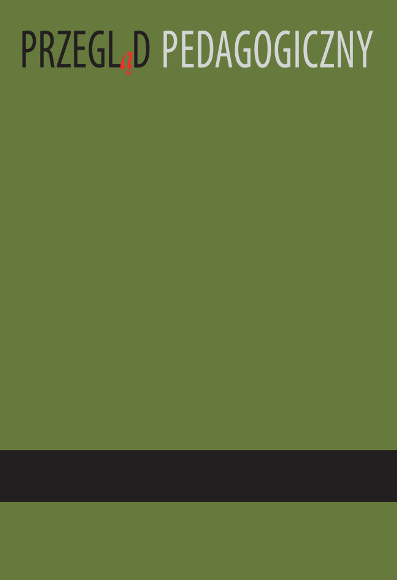From function of assessment to culture of self-regulated learning – dissertation on formative assessment
DOI:
https://doi.org/10.34767/PP.2018.01.07Keywords:
From function of assessment to culture of self-regulated learning – dissertation on formative assessment, didactics, feedback, learning culture, assessment, formative assessment, learning process, self-regulated learningAbstract
The main aim of this text is to discuss ‘formative assessment’, which has been getting more and more popular in the Polish educational environment. The basic questions in this area are aimed at determining whether formative assessment is simply a kind of assessment, or rather a kind of innovation, a process, or maybe a set of didactic techniques or strategies, or rather a set of effective teaching norms, or something else/ something more? Based on the review of the available domestic and foreign literature on the subject, an attempt was made to clarify and harmonize the terminology associated with the discussed issues and to define the essence of formative assessment. Then, the considerations on the culture of self-regulated and autonomous learning were made, because the discussed activities and proposed strategies identified with ‘formative assessment’ are the expression of the intended creation of a specific didactic environment. The synthesis of these considerations is the proposal of a theoretical model of formative assessment developed by Ian Clark (2012). This model is a combination of cognitive, social and cultural learning theories that determine the behavior of the teacher and initiate self-regulated learning strategies of students.
References
Bennett R. (2011). Formative assessment: a critical review. Assessment in Education: Principles, Policy & Practice, 18, 1, 5-25.
Bereźnicki F. (2015). Dydaktyka szkolna dla kandydatów na nauczycieli. Kraków: Oficyna Wydawnicza Impuls.
Black P., Wiliam D. (1998). Inside the Black Box: Raising Standards Through Classroom Assessment. London: Granada Learning LTD.
Choroszczyńska M. (2015). Nauczyciel ocenia… Meritum. Mazowiecki Kwartalnik Edukacyjny, 1(36), 8-12.
Clark I. (2012). Formative assessment: Assessment is for self-regulated learning. Educational Psychology Review, 24, 2, 205-249.
Dunn K.E., Mulvenon, S.W. (2009). A critical review of research on formative assessment: the limited scientific evidence of the impact of formative assessment in education. Practical Assessment, Research & Evaluation, 14, 7, 1-11.
Filipiak E. (red.) (2008). Rozwijanie zdolności uczenia się. Wybrane konteksty i problemy. Bydgoszcz: Wydawnictwo Uniwersytetu Kazimierza Wielkiego.
Filipiak E. (2009). Uczenie się w klasie szkolnej w perspektywie socjokulturowej. Forum Dydaktyczne, 5-6, 82-98.
Furtak E.M., Cartun A., Chrzanowski A., Circi R., Grover R., Heredia S.C., Johnson R., McClelland A., White K.H.O. (2015). Toward a participation metaphor for formative assessment. Paper presented at the Annual Meeting of the American Educational Research Association, Chicago, April 17, 2015.
Greenstein L. (2010). What Teachers Really Need to Know About Formative Assessment. Alexandria: ASCD.
Hattie J. (2015). Widoczne uczenie się dla nauczycieli. Jak maksymalizować siłę oddziaływania na uczenie się. Warszawa: Centrum Edukacji Obywatelskiej.
Klus-Stańska D. (2002). Konstruowanie wiedzy w szkole. Olsztyn: Wydawnictwo Uniwersytetu Warmińsko-Mazurskiego.
Kolber M. (2008). Poznawcze i metapoznawcze strategie uczenia się – w kierunku uczenia się samoregulowanego. W: E. Filipiak (red.), Rozwijanie zdolności uczenia się. Wybrane konteksty i problemy. Bydgoszcz: Wydawnictwo Uniwersytetu Kazimierza Wielkiego.
Kruszewski K. (2004). Sztuka nauczania. Czynności nauczyciela. Warszawa: Wydawnictwo Naukowe PWN.
Kupisiewicz C. (2012). Dydaktyka. Podręcznik akademicki. Kraków: Oficyna Wydawnicza Impuls.
Melosik Z. (1997). Poststrukturalizm jako teoria życia społecznego (możliwości i kontrowersje). Kultura Współczesna, 1, 57-71.
Nadolnik I. (2015). Ocenianie kształtujące w edukacji wczesnoszkolnej. Próba odpowiedzi na oczekiwania rzeczywistości XXI wieku. Edukacja Elementarna, 36, 2, 43-55.
Niemierko B. (2002). Ocenianie szkolne bez tajemnic. Warszawa: Wydawnictwa Szkolne i Pedagogiczne.
Niemierko B. (2007). Kształcenie szkolne. Podręcznik skutecznej dydaktyki. Warszawa: Wydawnictwa Akademickie i Profesjonalne.
Opłocka U. (2009). Między ocenianiem uczenia się ocenianiem dla uczenia się. XV Konferencja Diagnostyki Edukacyjnej. Kielce 2009.
Przybylska E. (2014). Kultury uczenia się: kilka refleksji w kontekście uczenia się przez całe życie. Rocznik Andragogiczny, 21, 119-131.
Pytka P. (2017). Czy OK jest rzeczywiście OK? Mocne i słabe strony oceniania kształtującego. Edukacja Pomorska, 81(32), 5-7.
Sterna D. (2007). Czy ocenianie kształtujące się opłaca? Psychologia w Szkole, 3, 33-44.
Sterna D. (2014). Uczę się (w) szkole. Warszawa: Centrum Edukacji Obywatelskiej.
Sterna D. (2016). Uczę się uczyć. Ocenianie kształtujące w praktyce. Warszawa: Centrum Edukacji Obywatelskiej.
Szyling G. (2010). Ocenianie kształtujące, czyli o niejednoznaczności. W: Teraźniejszość i przyszłość oceniania szkolnego. Kraków: Polskie Towarzystwo Diagnostyki Edukacyjnej.
Trumbull E., Lash A. (2013). Understanding formative assessment. Insights form learning theory and measurement theory. San Francisco: WestEd.
Wiliam D. (2007). Keeping learning on track: Formative assessment and the regulation of learning. W: M. Coupland, J. Anderson, T. Spencer (red.), Making Mathematics Vital: Proceedings of the Twentieth Biennial Conference of the Australian Association of Mathematics Teachers. Adelajda: The Australian Association of Mathematics Teachers Inc.
Wiliam D. (2011). Embedded Formative Assessment – practical strategies and tools for K-12 teachers. Bloomington: Solution Tree Press.
Wiśniewska M. (2009). Nauczyciel w nowoczesnej kulturze uczenia się. Forum Dydaktyczne, 5-6, 59-69.

